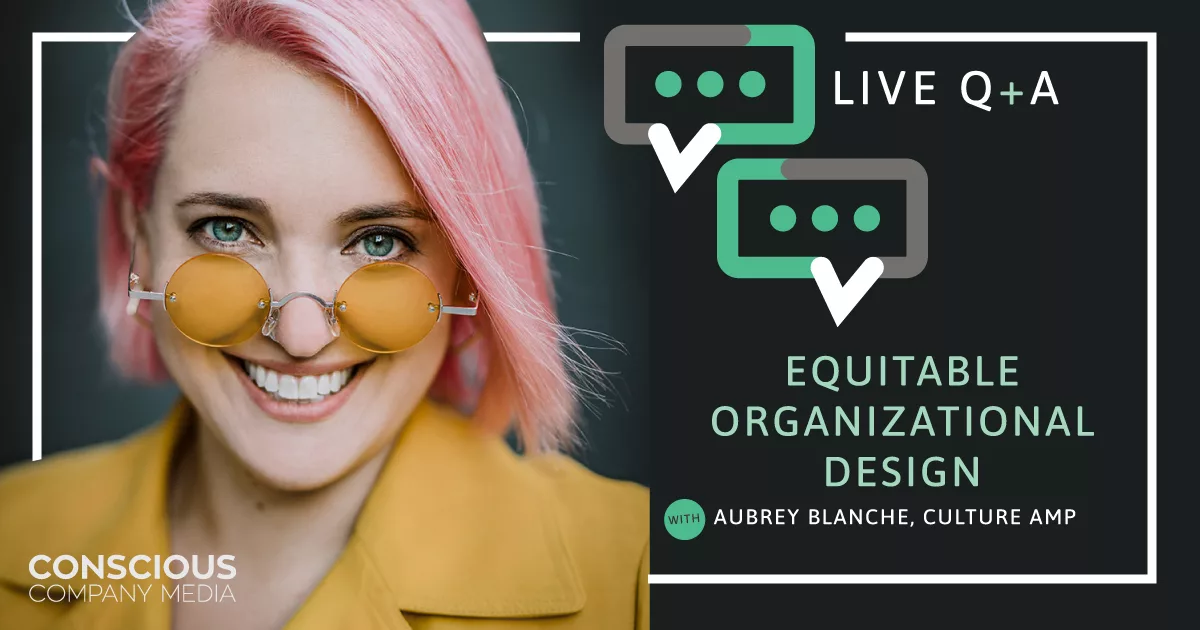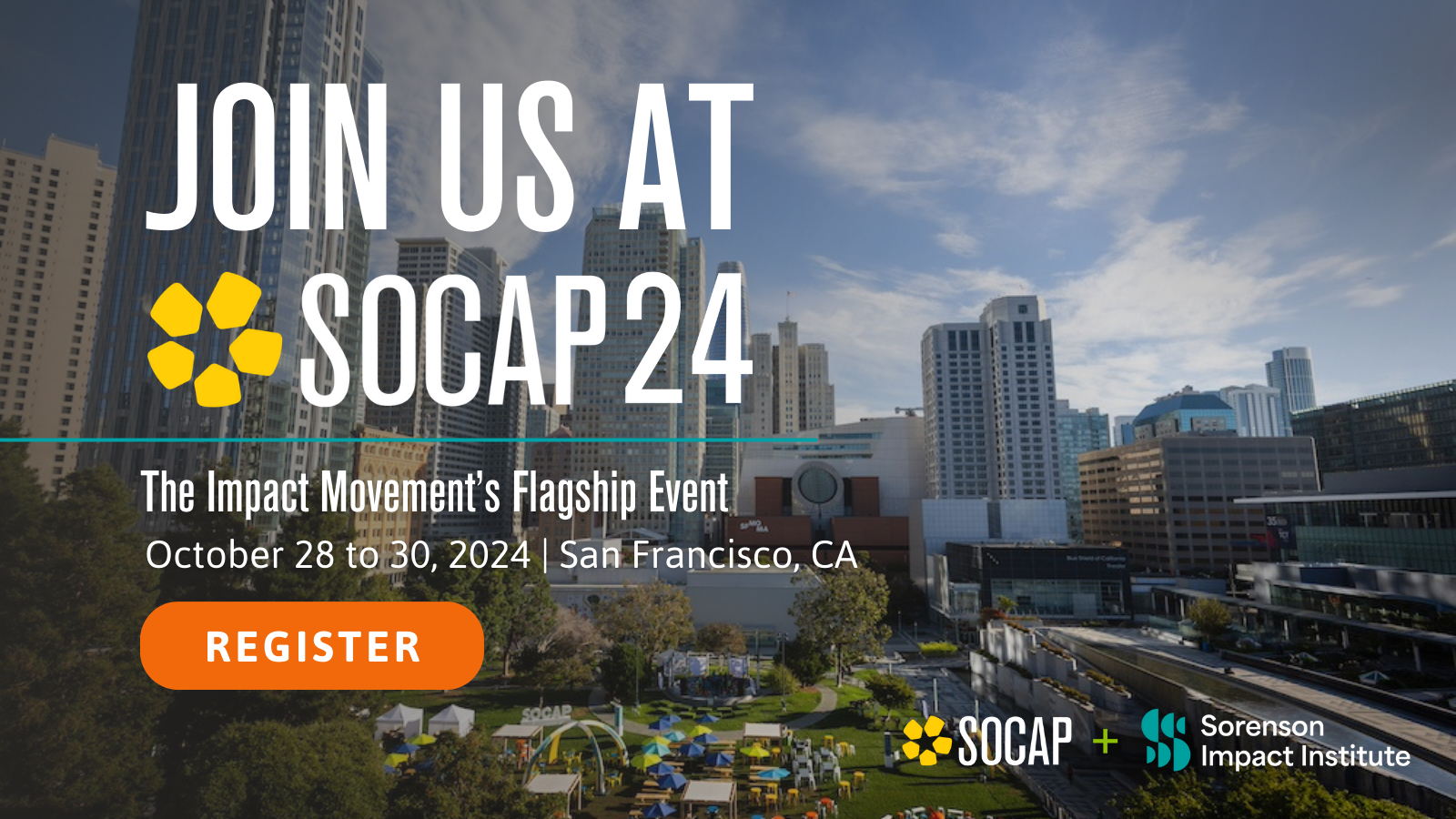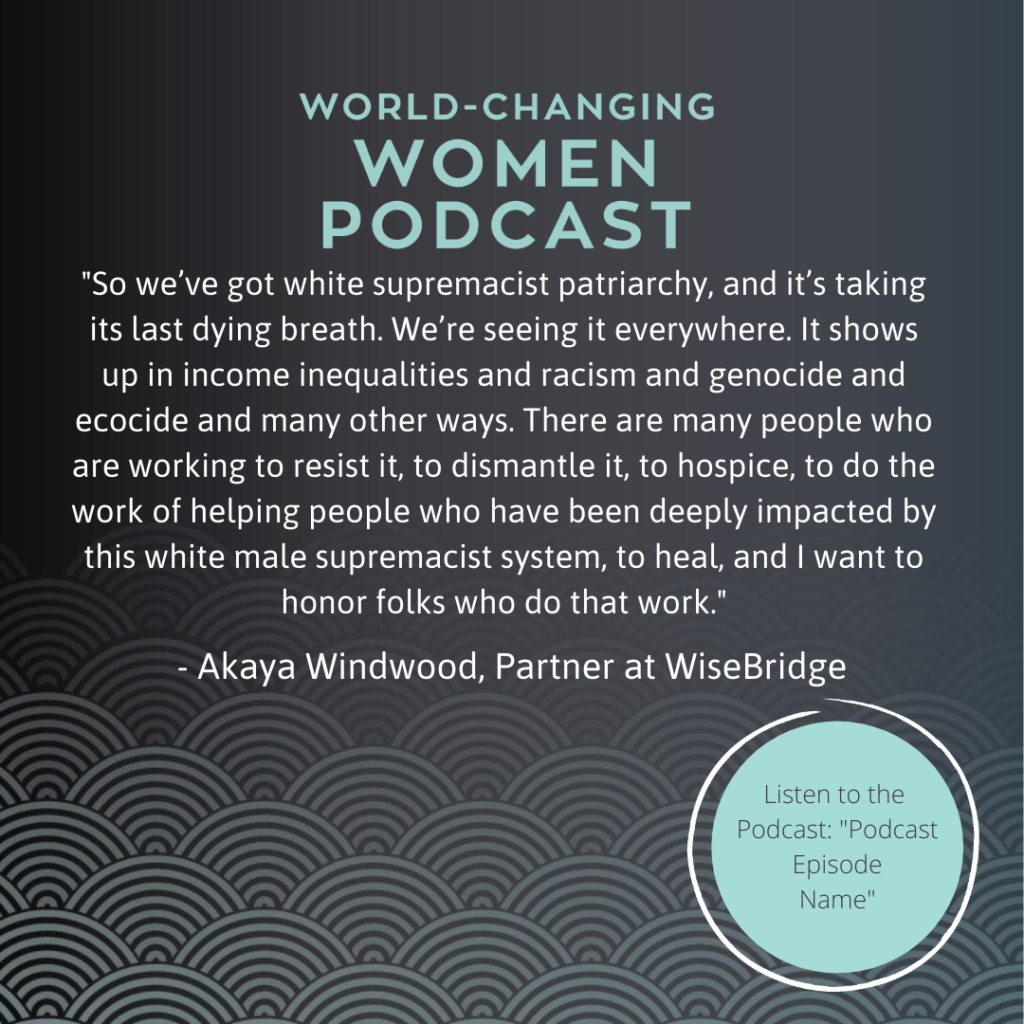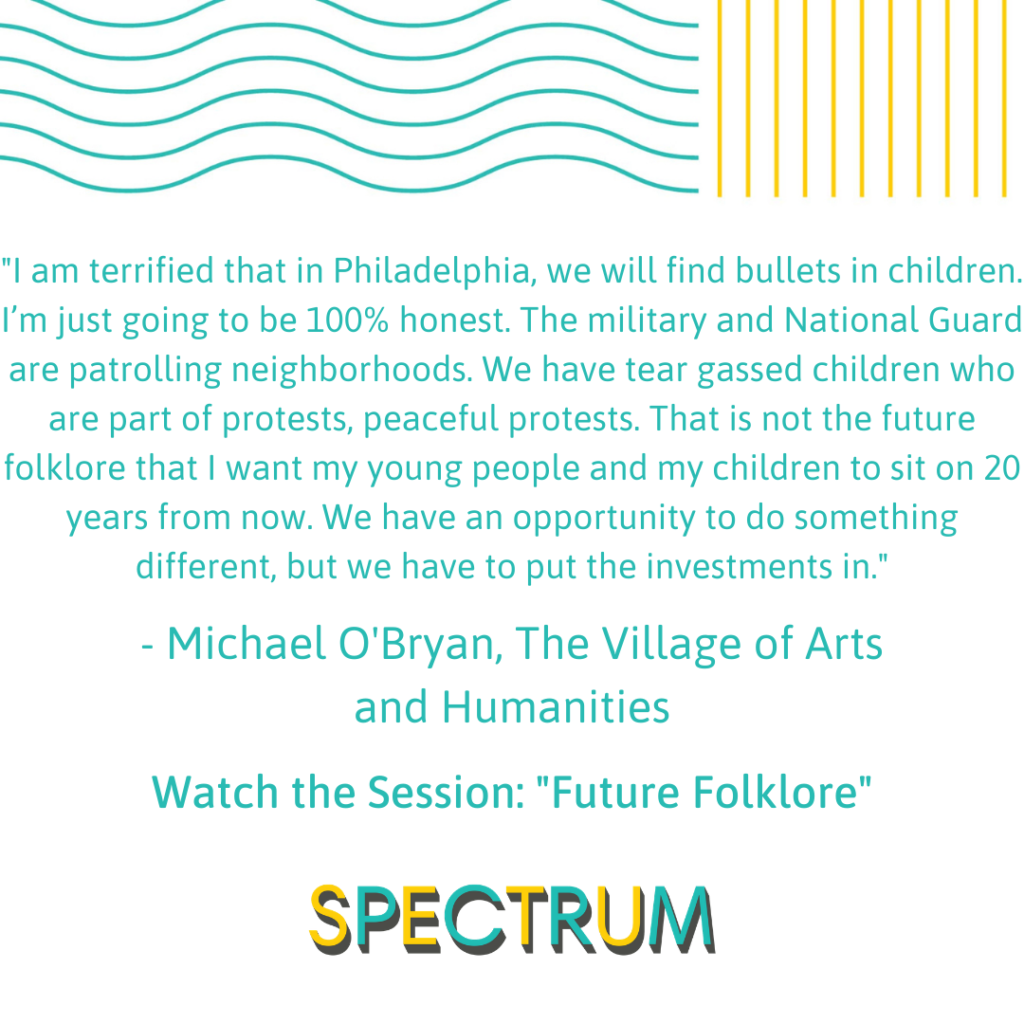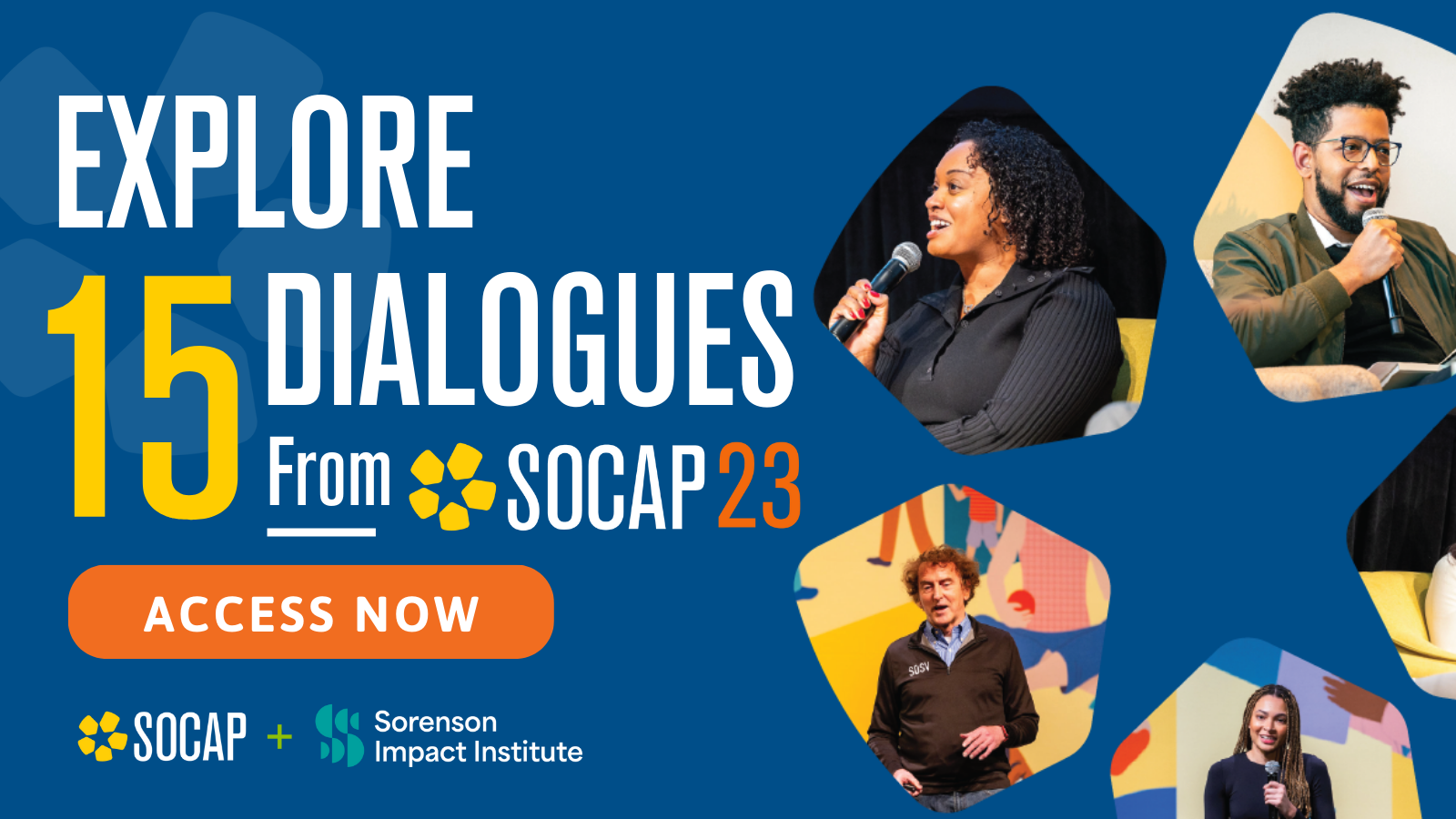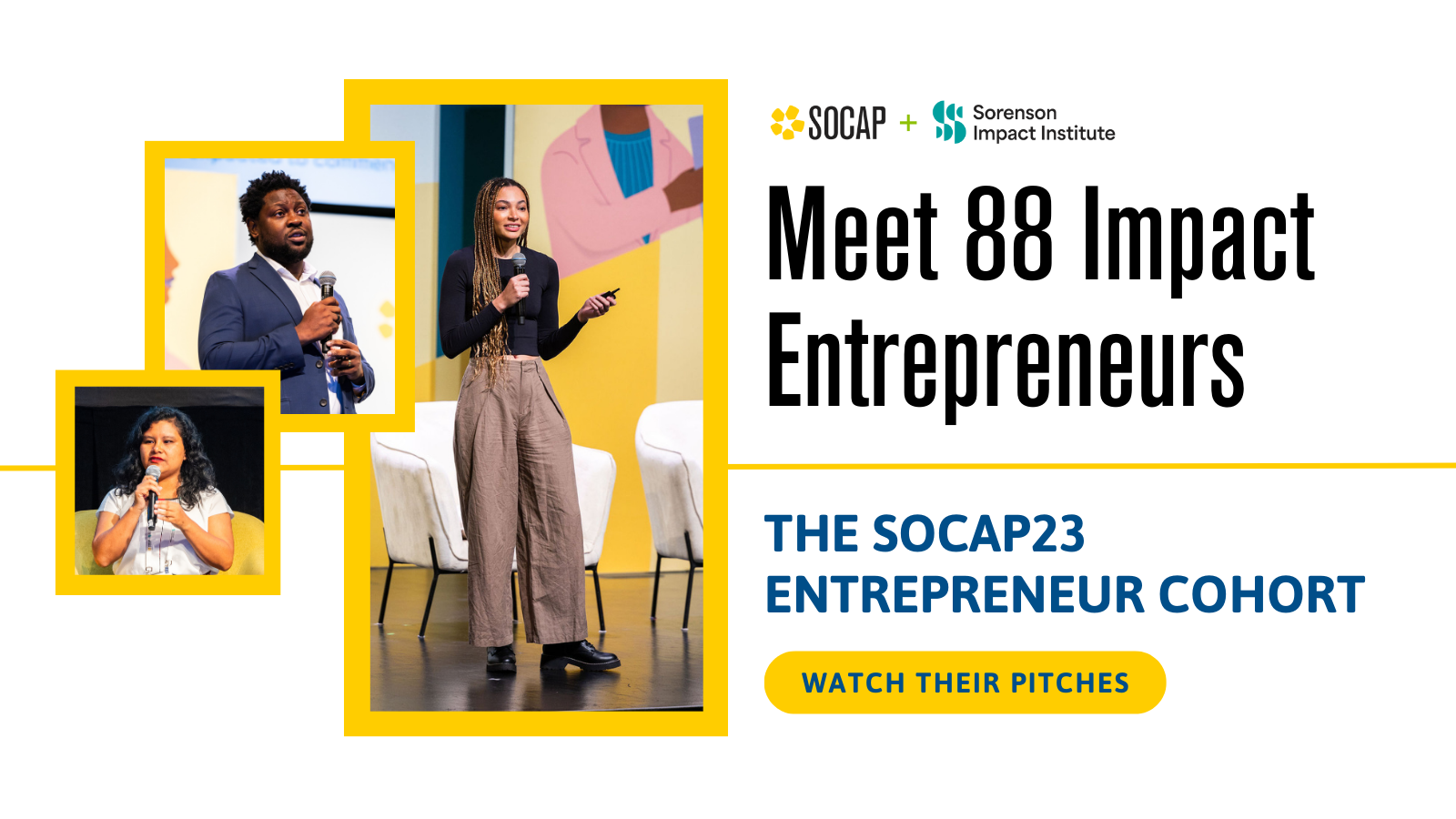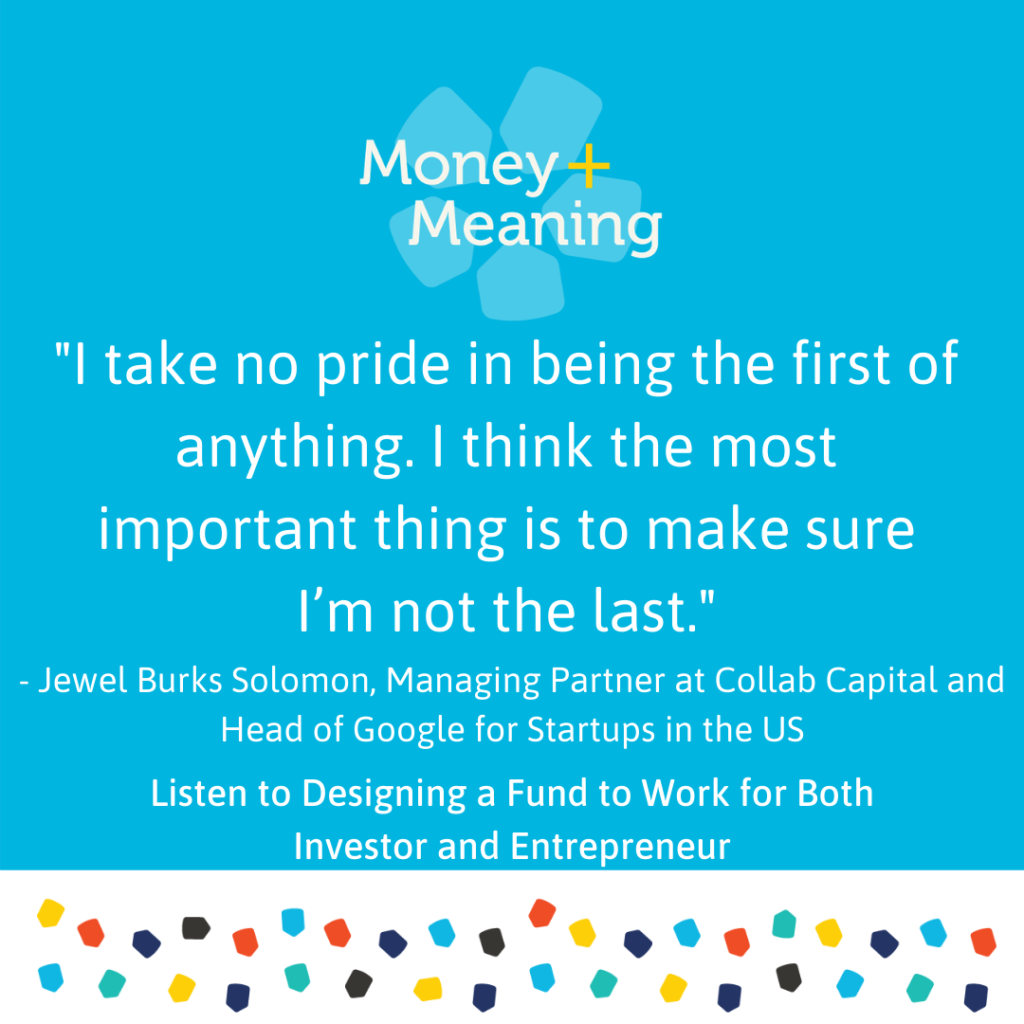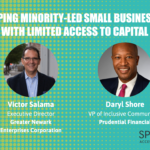How Organizations, Business Leaders Can Collaborate to Create Welcoming Spaces for All with Equitable Design
Diversity and inclusion are values that many businesses are currently prioritizing and centering in their work. Yet, increasing diversity and inclusion alone does not necessarily change the structural barriers that marginalized folks face in our economy nor does it inherently create systems in which those individuals can gain access to real influence and decision making.
Aubrey Blanche, Director of Equitable Design and Impact at Culture Amp, wants leaders in the impact economy to move from diversity and inclusion to equity and belonging.
“In theory, inclusion is this idea that someone is in a workplace or organizational culture, but I actually want to be really frank that being included sucks,” Blanche said. “It’s like being tolerated, and there’s research that shows that being tolerated actually causes psychological damage to people because being tolerated means that someone sees something wrong with you but deals with their emotional reaction to allow you to be in that space. So what I would encourage everyone to do is to think instead about creating belonging. It’s a core human need, we’ve all got it, regardless of our color or our life experience. But that moving from inclusion to belonging is critical because it’s moving from ‘We created a space, and it’s fine if you show up,’ to ‘We created a space for you,’ or ‘We created a space with you,’ if you’re doing it right.”
In this Q&A, Blanche answers questions about equitable organizational design and how creating welcoming spaces for everyone requires intentionality that permeates an entire organization. Watch the Q&A or read the full transcript below.
Watch Equitable Organizational Design
Kate Byrne: Good morning and good afternoon everyone, depending upon where you are. Thanks so much for joining us this morning. I’m Kate Byrne, President of Intentional Media, and we oversee Conscious Company, SOCAP, SPECTRUM, World-Changing Women, and Total Impact. I am so excited today, both excited, poignant, a little saddened frankly, but the timing is so perfect to have this conversation with Aubrey Blanche, who is the Head of Equitable Design and Global Culture at Culture Amp. We both talked about the fact that we had planned this over a month ago, and little did we realize how much this conversation was really going to be necessary, both from an internal organizational systemic situation but also for those systems outside, so for instance, government, police and such.
So, in light of everything that’s taking place, we did just want to take a moment to acknowledge sadly those who have been in pain, have died, the families that are hurting. So with that we wanted to begin with just naming some of those who have fallen. So with that, I’m going to start. George Floyd.
Aubrey Blanche: Ahmaud Arbery, Freddie Gray, Michael Brown, Sandra Bland, Breonna Taylor, and so many more of our Black siblings who have been killed certainly by systems of white supremacy, which we’ll be talking about today. But I think we’re also waking up, many of us for the first time, to the collective knowledge that they have all been killed by our lack of attention and our lack of action. That’s the thing that’s sitting with me today, mixed in with my abject rage and my occasional tears in the middle of work. I’m also feeling a little bit of hope, and I wanted to offer that to everyone here as we get into the discussion. So Kate and I were excited to do this, and I think now there are so many people, so many folks here, thank you for being here, that are aware for the first time. Maybe sitting in the guilt and shame too of, “I didn’t do anything before.” And awesome, take that to your therapist, not a person of color, and second, let’s just do something going forward and better.
So many people are looking for ways to act and there are incredible resources to tell you how to act on an interpersonal level, incredible resources to tell you how to act in your communities, in your political decisions, and what type of remedies we need to stop these ongoing issues. But what we want to talk about today is equitable organizational design, which is a critical way that we fight these issues by helping our Black colleagues have a fair set of experiences and the opportunities they deserve and our hope is that the discussion inspires you and empowers you to understand that the racism that’s inherent in our organizations is a choice and we can choose something different. We can build a better world than the one we have right now because the one we have right now is frankly not good enough.
Kate Byrne: That was one of the lines that I had mentioned actually in the description — everyone keeps talking about what’s the new normal going to be. Well, the old normal was horrendous for many. So I don’t even want us to even think about that notion of normal. Two quotes are brought to mind, actually. Martin Luther King Jr. was saying, “There comes a time when silence is a form of betrayal.” But then when I think about this equitable design piece I go back to, totally dating myself perhaps, but George Orwell’s “Animal Farm,” and the fact that all animals are equal but some are created more equally. So that notion that, sure things are equal, but then there’s the real equal.
So what I wanted to do before we dive in, because this is a juicy topic and we could frick and frack all day long, and I had a couple of housekeeping things. When you have questions, please by all means, if you could put them in the Q&A or the chat. We’d love to know too who we’ve got here, so feel free to join in and say hi from, I’m in San Rafael, you’re in the East Bay, just so we kind of get a sense. Then we’ll be turning and including some of the questions that we’ve received throughout the program. I thought a good starting point frankly would be making sure that we’re all looking at these terms and phrases, definitions from the same place. So I mean, I’ve got some notions of diversity, inclusion and equity, but how do you define those?
Aubrey Blanche: Yeah, so I think there’s how I define them, which is perhaps less important than how people tend to define them. So I’ll define them and then I want to talk a little bit about why I think the words diversity and inclusion are a huge part of the problem. So I think in the theoretical sense diversity means a mix of things, but in the way that we’ve used it the word diversity, and this research was done by myself and the team when I was at Atlassian in 2018, so Atlassian’s 2018 State of Diversity Report, showed that the word diversity people actually overwhelmingly associate that with white women and Black Americans, even outside the US.
Now, the reason that ends up being a problem, you might say, “Wait, it’s great, we think about Black people.” But the fact is that word also encompasses white women. So often what we see is companies will say something like, “Well, we’re really diverse.” And yes, they have actually improved on gender diversity for white, cisgender, economically privileged women, which is a teeny, teeny, teeny tiny step forward, but they’re actually ignoring, and in many case actually marginalizing Black people and that doesn’t even get at folks with disabilities, right? The Latinx community, queers folks, on and on, and on and down.
So I actually like to talk about either building balanced teams, right? So that’s what we’re trying to do, is build a balanced set of teams or focus on creating equity generally. So you mentioned equality, which is the difference between equality and equity is that equality actually, if we’re in a world that’s already unfair, keeps the world unfair. There is a very silly example that I use, but for folks who can’t see right now because I’m online, I am five feet tall, I’m a very tiny woman, and it turns out equality would be giving everyone in my house a step stool. But it turns out that not everybody in my house needs a step stool in order to get the teapot out of the cupboard. So equality is giving everyone the same thing, and equity is giving people what they need to thrive. So in that scenario it would be I get a step stool and my housemate doesn’t because it turns out he can reach the second shelf in the cupboard.
The last term we talk a lot about is called inclusion. In theory, inclusion is this idea that someone is in a workplace or organizational culture, but I actually want to be really frank that being included sucks. It’s like being tolerated, and there’s research that shows that being tolerated actually causes psychological damage to people because being tolerated means that someone sees something wrong with you but deals with their emotional reaction to allow you to be in that space. So what I would encourage everyone to do is to think instead about creating belonging. It’s a core human need, we’ve all got it, regardless of our color or our life experience. But that moving from inclusion to belonging is critical because it’s moving from “We created a space, and it’s fine if you show up,” to “We created a space for you,” or “We created a space with you,” if you’re doing it right.
So that’s a lot of what my passion is, is really moving from diversity and inclusion to balance and belonging, or to equity and belonging, because I think that while a lot of good work has been done in the name of D&I, that language and that framework doesn’t serve us any longer and so it’s time for us to let go of that and move forward with a new framework and a new approach that’s actually going to get us what funding millions of dollars in PR hasn’t.
Kate Byrne: Right, so it’s essentially the evolution of D&I. I mean, D&I got us as far as we could, we’ll remember it was first diversity. And I totally agree with you. Usually when someone is talking about diversity it means oh great, we have a white woman with children onboard.
Aubrey Blanche: Again, let’s be real, straight white women also face barriers comparatively, and those should go away also, but I think that what tends to happen is that companies go, “Oh, we’ll start with gender,” because it feels obvious, because it feels achievable, because most of the executives know women who are related to them or are married to them. But it turns out that what that does is it creates something we call corporate white feminism, where basically we solved the needs for the most privileged women in the giant bucket of women, and we actually make it way worse for everyone else. So there is a different way to go about this, and we’ll talk about this using concepts like intersectionality and sort of workplace design to actually also help those women who you already wanted to help in the first place but also by considering the way that we help people with multiple barriers in front of them, for example like many Black women if not all of Black women.
Kate Byrne: Right. Well, that’s one of the things I wanted to kind of dive into a little bit, is the whole notion of and the difference of programmatic versus systematic.
Aubrey Blanche: Yeah. So I think this is also kind of the evolution from D&I to sort of equity and belonging is that historically, and again, sort of building the foundations, a lot of organizations have taken the approach of what best practices should I implement. I need ERGs, I need to put Black people on my careers page, I need to pay $100,000 to do a diversity report. I need to spend a couple $100,000 on marketing to explain why I’m a good place to work for LGBT people. I’ll be totally honest, some of those things are effective, some of them aren’t. Or another good example is companies love to run unconscious bias training. Fun fact, the concept was invented by attorneys to cover some legal liability and that research is incredibly mixed on whether it’s effective but it is known that the quality of those things vary a lot, and a bad quality training will reduce motivation for people to be inclusive and potentially make your employees more racist.
Kate Byrne: Oh wow. Wow, talk about swing and a miss.
Aubrey Blanche: Right. And the reason for that is really, really simple — and this goes back to the programmatic versus structural question — which is that our brains have built up biases over our entire lifetime of taking in information. You cannot undo all of those patterns in a two hour training no matter how brilliant your facilitator is. It’s just not possible. So I think what we’re seeing is this evolution to a systems-based approach, which basically says a company is inputs and outputs, talent, processes, trainings, communities, right? All of these things, and we’re going, what are the principles of how this system works? Are we measuring that? How are we holding the system accountable? And so that’s really what equitable design and what I do is about. So saying, “Okay, I have my list of best practices, but before I look at that I’m going to go in and I’m going to measure what’s happening in my organization.” Obviously it’s the reason that I recently moved to Culture Amp because they have such incredible products for this. So our engagement survey allows any company, even if they don’t have a DEI practitioner, to understand what’s happening with their employees. It can cut that data by demographics, including intersectional demographics.
From us they can get 1,800 different benchmarks from their peer companies, but they can look at that and say, “Who is hurting? Who is not advancing? Who are we not hiring? Who is leaving at faster rates?” And then they can go run focus groups, they can go learn about why those things are happening and then begin to make different choices, and that will look different in each place. But if you’re saying, “Oh, we’ll, I’m not getting any underrepresented candidates at the top of my funnel.” Well, go back and say, “Are you advertising in places where they are? Why would they want to work for you in the first place? What have you done to demonstrate that you’re a safe environment for them? Are you making sure that you’re not adding requirements or hoops in your recruiting process that disproportionately selects them out, like requiring a degree from a top school, requiring a particular GPA, lots of different professional norms?” And so that’s when we can say, “Let’s change the system and then watch as different people come into it.”
Kate Byrne: So, are there some industries that are ahead of the game than others? And on the counter of that, or is it everybody pretty much just fumbling along? Are you seeing anything?
Aubrey Blanche: Yeah. I would say are there industries that are doing better? I mean, I think there are companies and hot spots within industries where people are doing well, but I would say overall companies do very, very good at spending PR money to make themselves feel better about not fixing the structural and cultural problems they have. As someone who has been chief diversity officer now for over half a decade, what I often see is that CDOs have great ideas, but the problem is because these problems are structural they’re so deep and entrenched that they need multiple years of work to start getting real progress on this, and they can’t actually get buy-in from their leaders to do anything but put recruiting dollars and marketing dollars out there. The problem is actually probably a super racist performance assessment and managers who don’t understand the different ways that underrepresented people show up and what support they need in order to thrive and get the opportunities they deserve.
So again, if you’re not funding it, fund it, but if you are funding a bunch of marketing, if you’re not funding twice as much internally, you’re doing it wrong.
Kate Byrne: I just remember when I was at Watermark and we would go and it was all about serving the ERGs, which meant check, we’re taking care of this. We have these different little groups, and so because we have those groups everyone’s got a voice. Then these heads of the ERGs were given a paltry amount. Here’s $10,000 for the year to support everybody and really drive change. I agree, it didn’t match the need at all, and it certainly wasn’t able to do long-term systemic change by any means in the imagination.
So, who’s influenced you? I mean, who do you watch, who’s your inspiration, who’s your archnemesis, who’s your Voldemort? Let’s get in there, Aubrey. We’re going there.
Aubrey Blanche: Okay, wait. So I’ll tell you who inspires me. So in the theoretical space Audre Lorde, Gloria Anzaldúa, the incredible Dolores Huerta, these thinkers who have already thought about radical change, right? I learned about change from Saul Alinsky and organizing. I was really inspired by Iris Bohnet who is a professor who wrote a book called “What Works: Gender Equality by Design.” Incredible research about the idea. She helped HBS stop being such an affirmative action program for their male students, and that’s what it is, right? Corporate America is an affirmative action program for straight, white, cisgender men, that’s the way it’s been designed because that’s who designed it and who they designed it for. And again, I think that it actually creates a not great experience for people in those groups as well as those of us who are historically excluded.
Kate Byrne: Agreed.
Aubrey Blanche: But yeah, there’s a lot of I guess radical philosophy that inspires me, but day-to-day I think about the people who are just doing really thoughtful work. So people like Y-Vonne Hutchinson who is the CEO of the ReadySet, who takes a human rights framework to this, a structuralist. I think about Karla Monterroso who is the CEO of Code2040. I feel like every single thing that I ever get from her is full of wisdom and I’m a better leader for having been exposed to her. I think about LaFawn Davis at Indeed, Candice Morgan at Google Ventures, some of whom are my closest friends. Adi Barreto who does amazing work in the trans and non-binary Latinx community. These are people that you can find online, and I think what’s really important about who inspires me, who teaches me, these people both are and are not superheroes. So if you want to learn more about this, if you want to learn about the experience and what’s happening read James Baldwin, right? If you want to learn about white fragility, Robin DiAngelo has a really great book. Read Dr. Kendi on “How to Be an Antiracist.” Ijeoma Oluo, “So You Want to Talk About Race” is I think one of the best books published in the last 10 years in this country. The 1619 Project in The New York Times.
So I think we’re really lucky in that we’re seeing a renaissance of these voices being pulled to the forefront. So those folks inspire me in terms of content, and like fire and energy to do this. Then in terms of who inspires me to understand how to do equitable design, I think you need to go back to all of the people who are writing business books, right? What I’m talking about is using design principles to design your organization. I think about the MBA books, right? Everyone acts like this is really hard, and the thing that I coach leaders on is you know how to write a strategy, write metrics and fund things to get to an outcome, you know how to do that already.
Kate Byrne: That’s all this is.
Aubrey Blanche: Saying that this work is a priority, and I think what you mean is this is priority number 52 but I feel guilty saying that that’s true. I think what I ask leaders, I ask companies is just be honest about where on the priority list it is because we’re tired and we don’t want to put effort in if you don’t actually care. You get the culture you deserve if you don’t pay for this.
Kate Byrne: Yeah, that whole notion of you get what you tolerate.
Aubrey Blanche: Yeah, and who is my Voldemort? I want to bring back a conversation we had earlier. It’s not my Voldemort, but I will admit that I was shocked.
Kate Byrne: The irony.
Aubrey Blanche: So when we talk about equitable design, I’m talking at a really high level right now and sort of theoretical, and what I actually want to say is design the space you’re in. So if you’re a CEO, yes, I am talking about funding and supporting your CDO and letting them say uncomfortable things to you without penalty. But if you’re a line manager maybe it’s reading a couple of books, being thoughtful and trying to attend your Black ERG. Make sure to check for pay equity on your team. Tell your recruiting partner that you won’t hire for a role unless you’ve seen two qualified interested Black candidates. Those are things that you have in your power to choose, and so that’s what I want to say on that, which is important.
Going back to this idea of do what you can and use your influence, I think the example of someone who definitely does not have the sterling perfect ally record, but this last week Evan Spiegel, the CEO of Snapchat. I think about him stepping up and occupying the space that his power is equal to. So making a choice with his company to not support inciting racial violence, right? That’s a radical decision. It’s actually not, right? Kindergarten teachers tell five-year-olds, “Play nice with others, don’t hurt other people.” But not only is he doing that within his product, he recognizes that as a business leader in our times he has incredible social and political influence and he’s doing things like calling for a reparations tax, which quite frankly is a great idea, but I use that as inspiration for me to say even someone who maybe historically hasn’t been as active, look at what is possible to ask for and to demand, and to take that action. Maybe for you your version of that is voting for a DA that’s anti-incarceration.
Kate Byrne: Right.
Aubrey Blanche: Or asking for accountability for your local police, or making sure that you spend one hour a week reading and coaching résumés for Black job seekers, right? There are skills that we can all share. And who is my Voldemort? I go back and forth on this because I think it’s easy to point at the people who are openly ignorant and malicious, so I think we’re seeing protests at Facebook. I find Mark Zuckerberg’s decisions ethically indefensible, and at this point a human rights abuse by proxy. That’s my personal opinion. But I actually in many ways think that the people who are the most problematic, and this goes back to the words of Dr. King, which is the white liberals often do more daily damage, because again, it goes back to this corporate thing of I say we care but when it matters, when it comes time to do something, we drop off. I think what’s giving me more hope than anything is that less and less of that’s happening. I’m seeing not just more words but more actions, and I hope that people realize that this is not a trend, that this is a practice of living and moving through the world, of making choices in your work life and your personal life to create equity.
Kate Byrne: I want to bring up Jeff’s question because it’s very well timed. He’s asking, “How might organizations be designed and structured to allow the conditions for equity?” Top down hierarchies, as we’ve seen, are not helping because they create these power dynamics, which is really true. I mean, we’ve seen holacracies, we’ve seen flat, they all have issues.
Aubrey Blanche: Right. So I think my genuine belief is that power dynamics always exist. So rather than thinking about, “How do we create a universe without power dynamics?” Maybe we’ll get there in 100 years, but we’re so far from it that it’s not useful. So “How do we educate people about power dynamics?” And especially, “How do we educate those at the top to take serious responsibility and have accountability for the outcomes that they create?” I would say underrepresented folks often are worried about navigating those power relationships, and what we actually need is to educate people in positions of power what their obligations are and then build incentives for them. So what does that look like? That can look like having executives not just say thoughts and prayers, we stand with the Black community, but having each of your executives share their specific educational and development plan for what they are doing to learn what their role is. That might just be sharing the reading list that they’re running through this month. It might be them committing to, and eventually, right? They probably can’t do this all in one day, sharing the process and the priorities by which they’re ensuring that they meet Black candidates, both how they’re networking to broaden their network and what they’re empowering their hiring teams to do.
So I think that’s it, is when we speak making sure we’re speaking with a commitment that ties to our action, and then creating an incentive or a requirement for people to come back and report on yes, I did it. So I can tell you one of my practices is every quarter I send out a feedback request to at least 15 people I’ve worked with that says, “What’s one thing that I’ve done to exclude you in the last quarter?” and “What’s one thing I’ve done to include you?
Kate Byrne: Oh wow.
Aubrey Blanche: And then I literally produce a quarterly report, it’s like two paragraphs on myself. It says here’s the three buckets of things that I’ve heard and here are the two things I’m going to be focused on continuing and not doing over the next quarter. Thank you for your feedback. This whole exercise takes me 20 minutes every three months, but I definitely have learned a bunch of things that I’ve done. So I would offer that to everyone here, and that’s on an individual level.
So it’s really basic. In terms of thinking about how we structure companies, design in structures that allow the conditions for equity, it’s a great question, and the answer is it’s complex but possible. So at a really high level what we need to do is measure the system as it exists. So I’m coming from the people and culture side primarily, so that means what are you hiring rates, what are your promotion and growth rates, what are your retention rates, what’s your representation at different levels of the company? What is sentiment and engagement? How are people feeling? There you can dig in and you can identify the sources of existing in equity. Then the answer is if you don’t have it, hire experts to help you build towards that. I say that because you can decide that you’re focusing on equity from a racial perspective, equity from a disability perspective, equity from a military service and veteran perspective. There’s lots of different definitions and what activities you do depend, but there’s an incredible amount of resources out there to help you get started, but the first thing you have to do is commit to it and then measure where you are and be ruthlessly honest about where you are.
Kate Byrne: Right, radical trust, radical truth. So really quickly though, with regards to sentiment, I would think that would be hard to get people to really open up, especially if you don’t have a culture of belonging and inclusion, right?
Aubrey Blanche: Totally.
Kate Byrne: Even if it’s anonymous. So what’s a way that one can do that?
Aubrey Blanche: I think that one way that folks can do that is by using anonymized surveys. So at Culture Amp, this is one of the things that we offer is our customers can use attributed or unattributed surveys. So if you’re in an environment that’s low trust or you think is low trust providing more anonymity and confidentiality is important. So when you’re running those sentiment surveys be clear with employees the minimum reporting size so that they know they won’t be identified and they’ll feel more free to be honest.
If you have a higher trust environment, if you’ve built some credibility because you’ve taken action and then showed the impact in your business. Remember that exercise we did where we measured everything? We have to measure it again after we do things to make sure that what we design for actually happened, because yeah, this is a complex topic, but that’s it. So measure, intervene. So whether that’s changing and performance management system or starting employee communities, or adding structured interviews to your recruiting, and then measure again and see if that thing had the impact that you wanted, which is an increase in this representation of certain folks. But it really, really is. This isn’t a we can get this done in three years, or there’s a magic bullet, or I can give you a template. It’s really about applying that method of measure, intervene, measure, adjust, measure, adjust, measure adjust and the whole time you need to be communicating openly about what you’re doing, and also just be humble about what didn’t work.
Kate Byrne: Well, I think you’re right. It’s messy, it’s going to be messy, and it’s a constant iteration and there’s always going to be some sort of rocky part. Thank you for that. I want to address Damian Solis, who has a great question, because we’ve sort of addressed this situation from top down.
So now what about the lovely people stuck in the middle who see it and they are frontline with the direct employees and it’s like, “Oh my gosh, I am with you,” and then you turn around and you talk to the higher ups and you just get pushed backwards like, “Yeah, we gave you $10,000 to impact an entire year.” What can they do?
Aubrey Blanche: So I think there’s two things. What can they do generally and then what can they do to influence leadership. And I recognize, first of all, that this advice comes and everyone makes their own economics and job security calculations on this, and has their own reasons they may not need that, so this advice is my radical advice and then I trust people to understand their own situations. But I think the first thing is take super ownership for making your team a place that is safe.
You can’t fix the whole company, but you can educate yourself on the types of microaggressions that Black people and non-Black people of color experience. Watch for those patterns and interrupt them. I promise you if you Google list of common microaggressions against Black people, Google will help you on this.
Kate Byrne: Insider just did a whole piece on 14 microaggressions.
Aubrey Blanche: Right, and I’ll give you a couple of examples. Confusing the only two Black people in the office for each other. Mistaking them for security and janitorial staff, not that there’s anything wrong with those occupations, but if they’re a senior engineer it doesn’t feel great. Weirdly touching Black people. I cannot tell you, I do not know a Black person that has not on a multi-monthly basis had their hair or bodies touched without their permission. People do not even realize that they’re doing it, but I am telling you, it is a thing, it’s weird. It is just a very strange pattern that I see all the time, so own that one. Using words like angry or aggressive to describe Black people, or asking them, “What’s wrong? You look angry.” We are actually socially conditioned to perceive Black people’s emotions in a negative way, even when they’re not having negative emotions at all. Can you imagine how exhausting it must be to constantly tell people you’re not pissed off? Can you imagine what you might feel like at the end of that?
Kate Byrne: I would be pissed off. Now I’m pissed off.
Aubrey Blanche: Also, watch for things like women of color getting interrupted more often while speaking, or people from majority groups repeating their ideas five minutes later and then everyone being more excited about it. Be aware of the way that you’re more likely to remember mistakes from people that are underrepresented and also you’re going to feel more uncomfortable giving constructive feedback to underrepresented people, and this is such an important thing for middle managers. I think there’s a really, really natural concern that that constructive critique is going to come across as sexist, racist, et cetera, et cetera.
The key to that is be specific. So I think you lack confidence is probably a terrible piece of feedback, one, because who wouldn’t lack confidence when the entire world tells them they’re not capable. But what you can say is you show this behavior is this meeting and I believe it’s having this impact. What can I do to support you to help you do something else instead? The reason this is important is because I see it all the time, and what that turns into is that underrepresented people end up underperforming because no one is telling them that they’re not doing exactly what is right for their role. So it’s not that they lack the capability, it’s not that they lack the skill, it’s not that they lack the interest or the intention but that we collectively fail them in giving the feedback that they need to continue growing and progressing at the rates that they need, which are things that their majority group counterparts are getting in higher numbers.
So what can a middle manager do? That. Then the riskier things that I think you should do, and I can tell you I did, which is probably why I’m in this career, is ask leadership to justify why, and I bet they say, “I don’t want to upset people, I don’t want to do this.” And the question I offer you to ask is why are we prioritizing your feelings over the experiences of these people.
Kate Byrne: I’m just writing that down.
Aubrey Blanche: And it’s a hard question to answer, because most people don’t conceptualize it that way. Then for people who can, I think you should ask a hard question about does your philosophy of life and your desire for organizational justice and equitable organizations align with that leadership’s vision? I really believe at the end of the day it’s going to be white people quitting our jobs and screwing over businesses that don’t care that’s going to do a lot to create these things. If you are white, if you are from a majority group, if you’re not a Black or Indigenous person I say that as a Latina who passes as white and who tries to use my voice whenever possible, understand that your voice carries more weight in rooms of power, say something, make your voice known, put pressure, because I think we have a moment where the pressure is happening and we need to keep it on because there is change that can happen. If you’re nervous, recruit friends. Send an open letter signed by 60 different people. It’s a lot harder for them to screw you over if there’s 150 people that signed onto that. So yeah, there are things you can do to express your voice.
Kate Byrne: Because that was one thing, using your voice, I agree, and there are introverts.
So I mean, hat’s an everyday thing in a regular meeting, right? How do you make sure that they’re being heard?
Aubrey Blanche: Yeah, but I think right, I think that there was, and introverts go back to this idea of people who may not feel safe using their voice. Can you find alternative ways to get ideas into the room? So these are very classic inclusion things but might help especially for people whose voices get railroaded. Make sure that you’ve sent an agenda at least a day in advance, so folks who like to think before they speak have time to reflect. If you’re asking an open-ended question, understand that some people may not want to jump in. So why don’t you say, “Everybody take two minutes and write your thoughts down?” Why don’t you offer the floor first to someone who normally isn’t the first person to jump in, right? And you can lay that onto these sort of EDI categories. Those are just good ideas generally.
Kate Byrne: That’s just good leadership, exactly.
Aubrey Blanche: But those things have a disproportionate positive impact on underrepresented folks. So you can design your team meetings to be more inclusive, right? You can design your interactions to be more inclusive, and if we all do that and those of us that actually build the HR systems choose to do that in our scope of work, that’s where really fundamental change happens.
Kate Byrne: So that was one question I was going to also ask, is so what are some of the outcomes you’ve driven as a result of using these various approaches?
Aubrey Blanche: So for folks who don’t know, I’ve been at Culture Amp just a couple of months, so the outcomes I’ve driven are mostly strategy. So I was at Atlassian for five years and I think that the changes that we saw within six months of launching are sort of Black strategy around employee engagement and hiring. We had improved hiring from 1.9 to 4.5%. Over the four and a half years I was there we tripled the representation of women in engineering. We made sure that our senior leadership was actually leading the company in terms of female representation, which included bringing on women of color into our C-suite and our board. We also improved the representation of folks with disabilities, overall improved the representation of Black and Latinx folks in our technical staff, women in our technical staff and women overall.
So again, what’s really amazing about this sort of equitable design — you can follow me at AubreyBlanche.com, I’m The Mathpath, I talk more about this there and on my Twitter. So at Atlassian, for example, we used Black women as the person we’re designing for when we’re thinking about a performance review process or anything that’s using the concept of intersectionality and the concepts of universal design to build a performance process that we felt was supportive not just of Black women but was supportive of lots of folks who are underrepresented, and it turns out that that translated into greater motivation, greater engagement, greater clarity, greater perceptions of fairness, which are what ultimately drove those big representation changes.
Kate Byrne: Got it. So I want to finish off, we went from top to middle, just in terms of the levels. So now what are things employees can do? Or again, solopreneurs, or social entrepreneurs themselves?
Aubrey Blanche: Yeah. I would say everyone can do their job a little bit better. And I don’t mean on top of your job, I mean, what’s a task that you’re doing today and how can you do it in a way with a little bit more of a mind towards equity? So if you’re a sourcer on the recruiting team, how can you dedicate these ideas for that next job? You have three hours set aside this week to source for that role. Why don’t you choose to make the first hour underrepresented candidates only? If you’re a hiring manager, why don’t you say, “I’m not hiring until I have a balanced slate of candidates, and also, I want all of my hiring panel to have a structured, repeated set of questions for each candidate.” If you’re a marketing manager, why don’t you make sure not just that you’re putting photos of Black and brown folks on your website but that you’re actually sourcing content from Black and brown writers and then paying them for it, not paying them in exposure, but paying them in cold, hard capitalistic dollars. If you are a VP, are you running a pay equity audit on your organization? Are you going to the ERG meetings? Are you personally learning and modeling for your team what it looks like to grow as an inclusive leader, not to be perfect, but to model what it looks like to educate yourself?
Try, fail and get feedback, and then do it better tomorrow. How much time do you have set aside? Are you saying it’s a priority or is there time and activity? And also I would say a big thing is are you making an effort, and this is for everyone, that your professional networks in the professional spaces you’re in aren’t just full of people who look like you? Are you talking to your kids about racism? There’s a lot of awesome kids books on this and it’s never too early. I promise you, families of color start talking to their kids about race hella soon. Your kids too, they’re old enough to understand, their brain already understands.
So I think those are the individual things you can do, which is the operating question is, what in my job could be done just a little bit more equitably? Not everything.
Kate Byrne: Right. Now, I have a question, because we’ve run into this a couple of times, quite honestly, and I’ll own this, is that we are trying to build out a more diverse team, diverse vendors, diverse partners, et cetera. How does a company — that has the heart to do that — then balance the need for getting the team member versus “My gosh, I need to fill this spot now?”
Aubrey Blanche: Yeah. I think how do they do that? They make a choice. I can go into all of the details but the fact is those are the moments when your dedication is tested and improved. Now, again, I’m not saying leave a role open for two years, but in many cases people are going, “Oh, this is impossible.” And we’re actually only asking for two more weeks, and I would love to see the math on how much the businesses cratered because you waited two more weeks to fill a role. So I want to be practical that it is a real problem. I mean, especially right now every company is sort of trying to hire underrepresented folks, which is great, I hope they get paid triple because goodness knows we need to make up for a couple 100 years.
Kate Byrne: I think it’s something like close to a million dollars, $950,000 that a woman of color will lose over the year because she’s paid about 61 cents on the dollar for a male.
Aubrey Blanche: Absolutely, but really I think that’s what it is, is be honest with yourself about and be specific. I’ve worked, I can tell you, when I was at Atlassian we had a rule for director roles and above, that we had to have a balanced slate, and there were some ways that we did that. We also had what we called a due diligence opt-out, where we had to prove that we had done the legwork to find underrepresented candidates. I can tell you in one situation it was a very specialized, very senior role that was based in a country where there wasn’t a deep talent pool for that. We spoke to 250 qualified people all over the world who we thought could be interested, and turns out 0% of them were open to relocating to another country for the job. So after those 250 conversations we said we feel that we have put the effort into this, and we will move forward with the candidates we have. So, when people say, “How much is enough?” I don’t know, until you get the results. But calling two Black people is not enough. That is not trying.
If you want to set your threshold, if you’re a big organization and you say, “We contact 25 underrepresented candidates for every role before I move forward.” Great, consider, can you make it 27 if you’re already doing it? And so I think it’s finding a happy medium. I know at Culture Amp we had a senior role that we kept open for nine months until we found a slate of candidates that we felt was balanced. It can be done.
Kate Byrne: Exactly.
Aubrey Blanche: I think that’s it, is go read Brené Brown if you need to, but be brave. I recognize that this feels radical, but it’s not.
Kate Byrne: Yeah. It’s how to change, you have to start somewhere and recognize it. So how has COVID-19 and the fact that we’re all sheltering in place, et cetera, and as the world starts to reopen, how has that impacted everyone’s sense of either belonging and inclusion?
Aubrey Blanche: So I’d say a lot of people are feeling isolated, of course. I think there is a mental health impact to that. I’ve also heard of frankly, it sounds counterintuitive to some folks, I think, but for a lot of people, visible people of color I would say that I talk to, the quarantine actually has been really good for their mental health because they’re dealing with less daily racial microaggressions in ways that are just good for them, so hopefully that’s motivating those of us on the call. I think that it’s also really important to notice that COVID is disproportionately impacting racial minorities. Also, layoffs are huge, they are disproportionately impacting Black women and other women who identify as women of color of communities of color more broadly. So understanding that right now we’re dealing with a corporate structure that wasn’t designed for this and isn’t actually equipped in a lot of cases to support folks long-term. That’s the easy part.
Kate Byrne: Right.
Aubrey Blanche: I share that because I hope that’s motivating that we can’t always solve everything, but companies can play a huge role in creating safety, economic security and stability. So that’s another thing I wanted to say, is companies should be running adverse impact analysis when they’re doing layoffs, if they have to, I understand what the business climate is, but often people just don’t look. It turns out discriminatory impact is discriminatory impact. So even if you didn’t mean it, look at your workforce, understand if you’re disproportionately laying these folks off, at least try to be generous because I think businesses are incredibly important in terms of economically stabilizing these communities who are being really hit right now.
Kate Byrne: I think especially now more than ever. Also in the terms of when you’re cutting back and you’re cutting back, because I know a number of companies that also feel that they’re getting their diversity and inclusion through vendor selection. So when money gets tight they start cutting off the vendors first, which still has that impact.
Aubrey Blanche: I would love to see if companies cut their swag budgets and their alcohol expense policies before they cut the $5 that they spend on Black people, just straight up. Sorry, I’m in a place today, but I’ve been asked so many times, “Oh, DEI is getting cut.” And I genuinely don’t know what to say to people when a company can literally say, “We no longer allow you to expense alcohol back to the company.” But the CDO all of a sudden has 60% less dollars. What you are saying with your dollars is Budweiser over Black people.
Again, if that’s your belief, not okay. But if it is, be honest. Let people choose because otherwise, quite frankly, you’re abusing those people by lying to them and putting them in an environment that’s toxic for them. So if you don’t want to act, at least let them know that it’s not a place where they’re going to be safe and let them find a place that is.
Kate Byrne: I totally get it, and in terms of accountability I think that’s really key, you’ve said three different things just in terms of key traits that are so important. Transparency is huge, communicate, communicate, communicate, and then accountability. Walk the talk, be the change you want to be. I agree, Budweiser over Black people — I was going to say out loud that’s amazing on every level — but was there a time when you had a misstep? I mean, I’m sure, of course, not that you’re the hallowed angel by any means.
But I mean, so when did you step in or what was one of the situations where was there a microaggression or was there something that you had done and it blindsided you and then how did you start opening up about this?
Aubrey Blanche: Oh yeah. This sounds like a weird thing to say, I’ve fucked up so much so often that it just doesn’t faze me when people tell me I fucked up nowadays, because I’ve just survived it long enough. Yeah, I mean, the fact is I’ve said some really ignorant things. This is an older one not related to the workplace, but I will share it because I think it goes back to the idea that we’re a product of our experiences. So I grew up in a very tiny town in Northern Michigan, and I went to a college in Chicago, and a sentence that came out of my mouth was, “Oh my god, there’s multiple types of Asian food.” Which is like, now, I consider generally one of the most ignorant things I’ve ever said, but thinking about that, I literally had never been exposed to Asian cuisine outside of one Chinese American restaurant. So now I live in California and I have every global cuisine I could want.
So a lot of times people say really ignorant things because they don’t understand the impact of them. So I’ve made assumptions. I think I’ve learned not to, but I’ve gone to individual underrepresented people and asked them their experience and then assumed that was true for all the people in that group. Those kinds of assumptions often cause me to say or do things that don’t land well.
Oh, here’s a really spicy one. It was in my first six weeks coming on at Atlassian. So I had gone down to Sydney, and I was very excited. Relevant to the story, I do identify as queer. So I met all of the employee resource groups in the office and did a session, and bless this Atlassian who posed me aside after and is like, “Hey, I know that this is your identification and in the US it’s okay, but queer is still a really offensive word here.”
Kate Byrne: Oh wow.
Aubrey Blanche: So in the US that word has very much been reclaimed by the community, but in Commonwealth British English and Australian English, it’s still very confronting, it feels very much like a slur. I was coming in to lead diversity at this company in my first meeting with the LGBT, the Outlassians is what we called them, and I used a slur because I didn’t know. It was horrifying.
So what happened? The first thing was that beautiful human being pulled me aside privately to say, “Hey, do you have a moment for feedback?” Get that micro yes. Said, “I don’t think you intended it,” appealed to my good human sense, “But this thing had this impact.” And I turned red, I wanted to die a little bit, and then I was like, “Great. I’m going to send a note to that group in the Slack channel with an apology, a thank you to you, and a here’s the words I’m going to use going forward. Do you think there is anything else I should do?” And they said, “No, that seems sufficient for this.” And so I sent that apology, and I shared that. You know what the thing I didn’t do was? Y’all, I’m not homophobic. No one needs to hear how not racist, not homophobic you are. Just be like, “Hey, whoops, I’m sorry. Here’s what I’m doing. Tell me if there’s something else that I need to do to repair this mistake.” And then you know what? Just move on.
Because otherwise what you’re doing is you’re asking those people you just barbed to make you feel better, which isn’t super fair. So I share that because you’re going to do it all the time, and try not to fail but you’re going to, so when you do, do it gracefully and beautifully.
Kate Byrne: And accept the humanity in it and then I think, yeah, I mean, I think that’s a really key piece. I was going to ask because you just raised the whole notion of global and how that gets a little complicated.
Aubrey Blanche: It does. So I think in general that the context is different but the principles aren’t, right? So the fact is that power dynamics exist everywhere, people who are marginalized exist everywhere. So you can use the same principles that you would use to talk about race for these other groups. That said, it is really, really important. I think folks get the idea that this race/Blackness/anti-Blackness issue is a US issue. It is most emphatically a global issue. So I think countries have very different social norms around communicating about it, so you’ll see France doesn’t collect data, tends to not want to talk about race but actually has some of the worst race relations in Europe when you look at sort of employment outcomes. You have cultures like Germany that actually have high facility in talking about historical ways that they repressed marginalized groups. I think in the US, we lie and say that we’re good when we haven’t necessarily fixed the foundations. So understand that anti-Blackness in particular is a global issue, but the principles of designing and thinking about equity are applicable to any population in any geography.
Kate Byrne: Right. So we’re nearing the end of our time. So I want to end on a hopeful note because you started off saying you’ve got some hope.
Aubrey Blanche: Yeah.
Kate Byrne: So what are some things that are making you hopeful and what’s inspiring you moving forward?
Aubrey Blanche: Yeah, what’s making me hopeful? What’s making me hopeful is that white people are doing things. They’re saying things that I think now is the time to do them, but I haven’t seen energy like this. So that’s making me hopeful because there is a huge demand for the services of people like me. We’ve been trying to educate so much, and so to have aggressive demand is great. I would say one thing really quickly is for folks who are looking for DEI experts, please put Black-owned businesses and Black practitioners to the front of the line, so part of this work and sort of deconstructing anti-Blackness, racism, and then creating equity is making sure that the economic value of that expertise and knowledge is flowing to the communities they came from. So if you can’t find a Black educator or they are overfull, please come to the rest of us, we will handle the overflow, but understand that we should be prioritizing economic impact to those communities.
Kate Byrne: Correct. And on that note, we’re having our SPECTRUM program, which is all about helping get more funding into the hands of founders of color next week. We’re really excited. It starts on June 9th and runs through the 11th. If you go to socialcapitalmarkets.net and then /SPECTRUM we’d love to have you come check it out. There’s going to be some amazing voices, really deep conversations, and then we’re doing a really great thing called civic dinners where you can have deep one-on-one conversations with each other in groups of 10. So we’re really doing everything that we can to kind of raise the visibility of this and do what we can to make sure that we’re doing our part in helping this all move forward.
Okay, so Aubrey, give us three items to do as homework assignments.
Aubrey Blanche: Three items to do as homework. One, go buy any book, read any blog by a Black person who is an antiracist educator. So I suggest Dr. Kendi, Ijeoma Oluo, Kimberlé Crenshaw, go educate yourself. Second, find a thing to be useful at. So whatever it is, commit for the next week to do one thing every day that’s antiracist or that is pro-equity in your organization. Have a conversation, give a piece of feedback, make a plan to change the way that you source. Then the third, give yourself some time, space, and respect with your community, your therapist or by yourself to process your feelings of guilt and shame about what you may or may not have done before. Use those feelings to fuel you, but let them go and try to find something that is joyful in this work. So this is heavy stuff, and it is trying to kill our joy, so understand that giving yourself space to feel happy and feel that joy is a part of keeping ourselves going so that next week you can do the things I just told you in one and two to do again.
Kate Byrne: That was terrific. Well listen, thank you so much, and I want to thank everyone who’s joined us today. We know that you have a choice where to be and we’re just really excited, and humbled, and honored that you were with us.
Aubrey Blanche: Aw, thank you. Always so grateful for you creating a space and a platform, and frankly for your courage and bravery. I don’t think I should call you an ally, I think I should call you an accomplice, which is what we actually need.
Kate Byrne: Very honorably. I’m excited by that.
Aubrey Blanche: Thank you so much for that, Kate, and thank you for everyone for listening, both for your intention and your desire to educate today and thank you in advance for the things you’ll do going forward.
